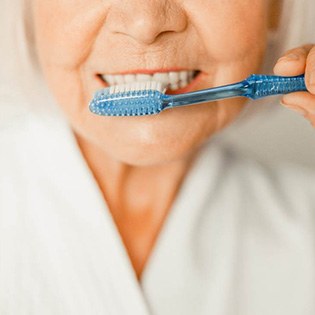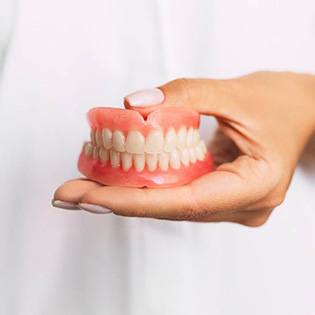Dentures – Tappan, NY
Eliminating Gaps in Your Smile
Are you living with damaged or severely decayed teeth? Feel embarrassed by the gaps in your smile? Worried your oral health will continue to decline because of your missing teeth? At Smile More Dentistry, our team is here to help you overcome the negative impact of an incomplete smile by recommending dentures in Tappan. These beautiful, custom-made restorations are designed to ensure a comfortable fit and pleasing aesthetic, allowing you to regain necessary functionality and confidence. To learn more about full and partial dentures, contact our office to schedule an appointment today.

Who's a Good Candidate for Dentures?

With only a few exceptions, basically anyone who has suffered tooth loss makes a good candidate for these accessible replacements. Whether you have just a few missing pearly whites or an entire smile, dentures can make all the difference and help you overcome all the pitfalls of losing teeth. Don’t hesitate to schedule your consultation and restore the functional, natural-looking smile you deserve.
Effects of Missing Teeth
Having holes in your smile comes with many downsides. For instance, you can feel more self-conscious about your appearance, potentially causing you to hide your teeth and avoid smiling altogether. Speaking or eating can also be difficult because of tooth loss. After all, you need teeth to articulate sounds and to bite and chew!
Even if you’ve found a way to perform everyday functions without a complete set of teeth, gaps in your smile can put your remaining teeth at risk. Over time, these teeth can shift into the space, which eventually changes your bite, and the jawbone slowly loses strength.
Fortunately, dentures can counteract the ill effects of tooth loss.
What Qualifies You for Dentures?
In general, dentures are a viable option for practically anyone with missing teeth. The only requirement is that you must have an otherwise healthy mouth. In other words, you can’t have a gum infection or other issue like a cavity. If you do, we’ll need to treat the condition first and revisit dentures when it’s fully resolved. In some cases, additional teeth need to be extracted.
Once you’re cleared of any impediment, dentures can be personalized to however many replacement teeth you need.
Alternative Tooth-Replacement Options
When it comes to dentures, there are basically three types available: partial, full, and implant dentures. Each comes with its own pros and cons, but these options can be customized to suit your particular needs. For example, if you would like your dentures to be more permanent and secure, we can explore whether implant dentures are a good choice. We would be happy to discuss dentures for your smile in greater detail in person during your consultation!
What Are Partial Dentures?

If you are missing multiple nonconsecutive teeth, you may be wondering what solutions are available that will restore the look of your smile? Since a fixed bridge and a full denture are not suitable options, you can achieve a more complete look with the help of a partial denture. These puzzle-piece restorations are referred to as “partials,” and they can easily fill in the gaps along your top or bottom arch, allowing you to enjoy a fuller appearance and functional smile.
How Partials Work

When preparing to receive a partial, you will first visit your dentist in Tappan for a consultation. They will examine your oral cavity and facial structure to determine how many teeth are healthy and identify those that can serve as stable anchors for your restoration. You will have impressions taken of your bite that will be sent to a dental lab. There, technicians will fabricate your partial using an acrylic gum-colored base and artificial teeth that are bonded into place.
Once it arrives in our office, you will return to have your finalized partial put into place. Metal clasps or clips will attach to the healthy teeth, allowing you to feel more confident in your smile.
What Are Full Dentures?

If you are missing an entire arch of teeth along the bottom or top row of your mouth, you may be experiencing problems eating and/or speaking. To remedy this issue, you may be eligible to receive full dentures. Much like partials, these restorations are custom-made according to your individual needs and can easily replace missing teeth along the top or bottom arch of your mouth. Using your natural suction to remain in place, some patients prefer to purchase a dental adhesive for added security.
How Dentures Are Made

The process of getting dentures might seem simple, but it's actually quite complex. Instead of making them in-office, we send your custom order to a dental lab that specializes in making dentures. Though the overall process may take a few months, the end result is worth the wait – your dentures will be tailored to fit snugly and comfortably in your mouth. Should you have any questions regarding any phase of this process, please feel free to reach out to us. We're here to address any concerns you may have.
What Are Dentures Made Of?

Dentures typically come in two main parts: the gum-colored base and the prosthetic teeth.
- Gum-Colored Base – This part of the denture mimics the appearance of natural gum tissue. It's commonly made from materials like resin, acrylic, or nylon, with acrylic being the most common choice. These materials give the denture a lifelike look and serve as a sturdy foundation for the replacement teeth. In partial dentures, the acrylic base may also feature metal hooks that attach to nearby teeth for added stability.
- Prosthetic Teeth – For a natural appearance and feel, the prosthetic teeth in dentures are often crafted from porcelain or, in some cases, resin. Both materials can be shaped to resemble real teeth, but porcelain is often preferred due to its durability and resistance to staining.
The Denture Creation Process

Creating dentures involves multiple steps, beginning with our team digitally taking impressions of your upper and lower arches. Using a small device, we scan your mouth to create a precise 3D image of your oral cavity. This data is then sent to our trusted dental lab, where technicians replicate your oral cavity and create a mold for the dentures.
Using this physical model, technicians use wax to recreate your gumline, and prosthetic teeth are attached to the wax dentures. Once these working dentures are ready, you'll come to our office for a fitting. If adjustments are needed, multiple fitting appointments may be necessary to ensure a perfect fit.
Once everything fits properly and looks good, the dental lab proceeds by using the mold to pour in acrylic and attach porcelain teeth. Before sending the final product to our office, technicians meticulously polish the dentures to ensure they look flawless.
Adjusting to Your New Dentures

While your new dentures are custom-made for your mouth, they might not feel entirely comfortable right away. It's normal for them to take some time to adjust, but they will soon feel as natural as your original teeth. When you first get them, we suggest sticking to softer foods and gently exercising your facial muscles. However, if you experience discomfort, please don't hesitate to reach out to us.
What Are Implant-Retained Dentures or Partials?

If a removable restoration isn’t what you envisioned, there is an alternative solution that offers greater permanence, durability, and functionality. With implant-retained dentures or partials, you can enjoy a more stable prosthetic that not only replaces the visible portions of your smile but also mimics the natural tooth root and encourages continuous stimulation to your jawbone.
How Implant-Retained Dentures Work

If dental implants are the ideal solution for your missing teeth, you will first undergo a consultation with our team at Smile More Dentistry. After thoroughly evaluating your jawbone density, gums, and teeth, we will determine if you require a bone graft to strengthen your bone. Because missing teeth can lead to a weakening of this area of your face, it is necessary you have a strong foundation before moving forward with implants.
If you are given the green light for surgery, you will then have your dental implants put into place by a skilled member of our team who will make one or more small incisions in your gums before carefully positioning each implant in the desired location. After closing the gum tissue, you will be sent home to recover for several months, allowing the implants to fuse with your bone and surrounding tissues.
Once you are fully healed, you will return to have your customized implant-retained dentures secured into place.
The Benefits of Dentures

Tooth loss can impact the daily quality of life by hindering your ability to chew and speak easily in addition to affecting your appearance. Whether you lost one, several, or all of your teeth, rebuilding your smile with dentures can mend your self-esteem, improve your overall health, and enhance your social life. Keep reading below to learn about the many benefits of restoring your grin with your dentist in Tappan.
Psychological Benefits

It’s not uncommon for people to struggle with accepting a sudden change that impacts their day-to-day activities the way tooth loss does. It can leave you feeling so self-conscious about the way you look that you develop depression or anxiety. Not only that, but you might avoid visiting with friends and family if you’re no longer able to talk or eat without feeling embarrassed. Our team can provide beautiful, lifelike dentures that boost your confidence and allow you to chew effectively and articulate clearly.
Clearer Enunciation

We form words by pressing our tongues to our teeth in specific ways so when you have gaps where your pearly whites used to be, it can be challenging to carry on a conversation. Once you’ve been fitted with artificial teeth, you’ll once again be able to distinctly enunciate different sounds. Although it can take about a month to adjust to wearing dentures, once you’re accustomed to them, speaking will once again become second nature.
Improves Nutrition

Another essential function of our teeth is to mash up our food into easily digestible pieces. When they go missing, you could develop gastrointestinal issues because you’re unable to do so effectively. Alternatively, you might find that your menu shrinks to easy-to-chew alternatives that don’t provide the same nutrients as a well-balanced diet. With dentures in place, you’ll once again be able to enjoy your favorite meals. You’ll have more access to wholesome foods to give your body the vitamins and minerals it needs to function at its best.
Preserves Oral Health

When your pearly whites fall out, any remaining natural teeth will shift to try to fill the gaps left behind. This leaves them prone to premature wear and tear because they’ll no longer be properly aligned. That means they’ll sustain all the added pressure from the force of your bite every time you chew. They could break or fracture as a result, which leaves them susceptible to additional infections. Thankfully, dentures take on a great deal of this additional weight to preserve your existing teeth.
Expands Opportunities

We only have one chance to make a great first impression and your grin is one of the first things people notice about you. If yours has wide spaces, you might try to remain tight-lipped or avoid talking. This can communicate that you’re uninterested or stand-offish which can spell trouble if you’re in the middle of a job interview or hope to get a promotion. One 2019 study even indicated that if you have poor oral health then you may be less likely to be employed. You’re more likely to be perceived positively with a full mouth of artificial teeth which means you can be more successful at work.
If you have questions or would like more information, you are welcome to contact us and we’d be more than happy to assist you!
Understanding the Cost of Dentures

While you might be looking forward to enjoying the benefits of restoring your smile, it’s important to understand how much you’ll need to pay for the treatment. Every patient’s dental situation will be unique, so there won’t be a set fee for the cost of dentures in Tappan. To receive an accurate price estimate, you’ll first need to schedule a consultation with our team. We will thoroughly assess your oral health and develop a specific treatment plan to address your dental needs. We’ll also walk you through your financing options to help make your restoration more manageable. Until then, here’s what you should know about the cost of dentures.
Factors That Affect the Cost of Dentures

During your initial consultation, our team will create a precise cost estimate based on several major factors, including:
- Preliminary Procedures – You’ll need to have a healthy mouth before moving forward with your dentures treatment. Depending on any issues we may detect, you may require procedures like gum disease treatment or tooth extractions first.
- The Type of Denture – The appropriate kind of denture will be based on the number of missing teeth. The more teeth that need replacing, the higher the cost of treatment.
- Materials Used – Our team only uses the highest-quality materials to replace your missing teeth. This may increase the upfront value, but you’ll expect comfortable, efficient, and lifelike results.
Are Implant Dentures More Expensive?

Other than traditional dentures, which sit atop the gum line, implant dentures rely on titanium posts that have been embedded into the jawbone beforehand. This will provide your restorations with the stability they need to function for many years to come. Implant dentures do come with a higher cost than traditional ones, but they can typically last several decades to a lifetime with proper care. You also won’t need readjustments or replacements as often, making this a cost-effective solution in the long run.
Does Dental Insurance Cover Dentures?

Although dental insurance policies vary from patient to patient, the majority of them will offer coverage for dentures. These restorations are considered “essential” restorative care, so you can expect around 50% of the final cost to be covered by your provider in most cases. However, you’ll still want to confirm the details of your policy with your insurance company before committing to your treatment. Our team can also help you navigate your plan and help you make the most of your benefits to minimize your out-of-pocket expenses!
Other Options for Making Dentures Affordable

Even if you don’t have dental insurance, it doesn’t mean dentures will be completely out of reach. Our team offers a variety of alternative financing options that can help make the cost of your treatment work within your budget. We can offer $75 for dental treatments if your dental insurance doesn’t pay. You can also consider signing up for third-party financing, such as CareCredit and Smile Savings Club, which can break up the total cost of treatment into monthly payments with little to no interest! With these options, you’ll be able to afford dentures without having to empty your wallet.
Dentures Aftercare

Dentures have the potential to significantly enhance both your appearance and smile function. Even if you don’t have any natural teeth left, it's incredibly important to continue attending regular checkups with your dentist. Our team will keep an eye on any remaining teeth and gum tissue, while also conducting screenings for potential signs of oral cancer. Since changes in your mouth can be hard to catch with dentures, early detection by your dentist plays a key role in achieving a full recovery. Click on the button below to learn about some more aftercare tips!
Remove After Eating

Following every meal, it's essential to take out and rinse your dentures thoroughly. This practice helps in preventing the accumulation of food particles and plaque. When rinsing, avoid using hot water, as it can distort the materials of the denture and cause your prosthetic to fit improperly.
Clean Your Restoration

Before cleaning your dentures, remove them from your mouth. Use a soft-bristled toothbrush along with a small amount of unscented hand soap, mild dish soap, or denture cleanser to delicately brush your dentures. Avoid using regular toothpaste, as it can be too abrasive for denture materials.
If you won't be reinserting your dentures right away, store them in water or a denture cleansing solution to prevent them from drying out and losing their shape. Always be sure to thoroughly rinse your dentures before placing them back into your mouth.
Keep Your Dentures Safe

When cleaning your dentures, consider placing a towel underneath you to catch them in case they slip from your hands. This precaution helps minimize the risk of denture damage. Additionally, ensure your dentures are kept out of reach of small children and pets.
Remove When You Sleep

It's strongly recommended to remove your dentures at night before going to bed. Wearing dentures continuously can impede circulation in your gums, potentially causing soft-tissue irritation. Sleeping with dentures has also been linked to increased risks of pneumonia and higher levels of plaque on the gums and tongue. To maintain their shape, store your dentures in a denture-soaking solution overnight.
Notice Changes

Stay vigilant for any changes in your mouth, such as mouth sores, gum irritation, or signs of infection, and promptly address them with your dentist. If your dentures become damaged, do not attempt to repair them yourself. Instead, seek assistance from our team! Additionally, if you notice any indications of ill-fitting dentures, such as shifting or clicking, inform your dentist right away.
Denture FAQs

If you’re struggling with missing some, most of, or all of your pearly whites, then dentures can be the life-changing solution you need for restoring your smile. While you can be sure to appreciate many benefits from this tooth-replacement option, you’ll want to be well-informed about the treatment before jumping on board. That’s why our team at Smile More Dentistry has collected and answered some of the most commonly asked questions we get about dentures in Tappan. Read along to learn more about this restorative solution or give us a call if you don’t see the information you’re looking for!
Will It Hurt to Get Dentures?
Only if you require having teeth pulled before getting dentures should you expect to experience some discomfort after the procedure. That said, you can manage any pain by taking over-the-counter and prescribed pain relievers as instructed by your dentist. Whenever you first wear your new dentures, you may feel some minor irritation as your mouth gets used to your new oral appliance. If transitioning to a new set of dentures, this process can take a bit longer, but it depends on the patient’s specific situation. Should you experience any persistent discomfort, don’t hesitate to give us a call. We’ll be able to address any underlying issues and ensure your dentures are as fitting as they should be.
Is It Hard to Talk with Dentures?
It can take some time to get accustomed to speaking with your new dentures, especially since your tongue is more used to talking with your natural teeth. The exact amount of time for learning to speak with these restorations varies from patient to patient. However, the more you practice, the quicker your adjustment process will be. Try repeating words and phrases that are difficult to pronounce and reading to yourself out loud. Once you’ve gotten the hang of this, you can move on to conversing with others to build your skill and confidence. Be sure to speak slowly at first since faster speech can often sound muffled if you aren’t accustomed yet.
Can I Sleep with My Dentures?
Most dentists highly recommend taking off your dentures before going to bed. You’ll usually need to keep your restorations in your mouth for the first 24 hours after receiving them, including when you sleep. After that, you’ll want to remove them every evening. Wearing dentures will typically restrict blood circulation to your gums, which can result in soft tissue irritation and even speed up ridge resorption. By taking them out overnight, you give your gums a break to recover and get the necessary nutrients to remain strong and healthy. Additionally, bacteria can easily thrive in dark moist areas, meaning they can collect and grow underneath your dentures if you leave them in while you sleep. To avoid serious health issues like pneumonia, it’s best to take them out (and soak them) before bed.
Can You Still Eat Steak with Dentures?
It’s usually difficult to chew tough meats with dentures, such as steak. That said, you may still enjoy your favorite foods by taking the proper precautions. Be sure to choose tenderloin or some other beef cut that doesn’t have as many muscle fibers and connective tissues. These components can make your steak harder to chew, increasing the risk of your dentures shifting out of place. Once you confirm the meat has been thoroughly tenderized, cut it into smaller pieces, and you should be able to eat it more comfortably.

